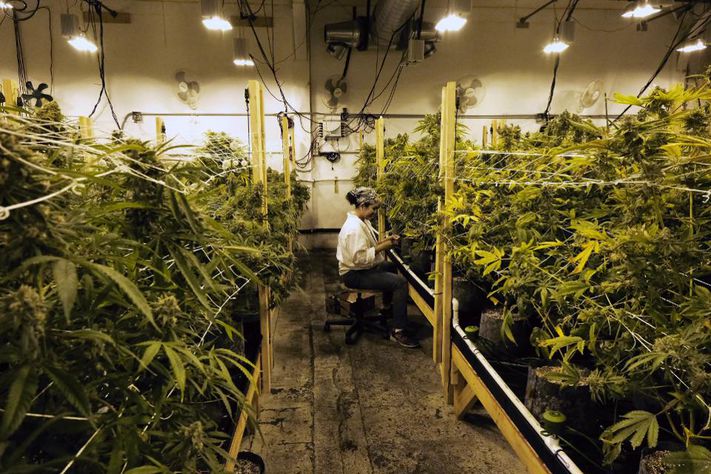America’s Heroes Shouldn’t Have To Break The Law To Get Relief With Cannabis
Markets — I write about business and the legal cannabis industry.

In this Monday, May 20, 2019 photo a worker harvests marijuana plants
at Loving Kindness Farms in Gardena, Calif.
(AP Photo/Richard Vogel)
ASSOCIATED PRESS
Although cannabis is legal in two-thirds of the states, the VA still can’t prescribe it.
The vast majority of the country’s 18.2 million veterans supports the legalization of cannabis for medical use, but the Veterans Administration (VA) cannot prescribe it to vets dealing with pain, anxiety or PTSD. That’s because the plant is still illegal at the federal level, and the VA, as a Cabinet-level organization, is not permitted to flout federal laws.
But bipartisan attempts are being made on Capitol Hill to nudge the VA closer to its members. Lawmakers are pushing a raft of bills that will force the VA to clarify where it stands on medical cannabis for the benefit of veterans who want to use the drug. In the longer run, the cannabis industry hopes that the VA will embrace the drug and become an important ally in the battle for full legalization.
A few weeks ago, Representative Seth Moulton of Massachusetts, a former Marine Corps officer, re-filed three bills in Congress that would force the VA to beef up its policy on medical cannabis, to conduct a federally funded survey into cannabis use among vets, and to train VA healthcare providers about the drug. The VA serves more than 9 million veterans, and it provides much more than just healthcare benefits: Former soldiers also receive disability compensation, education assistance, home loans and life insurance.
The federal prohibition of cannabis means that the VA’s current position on the drug reads more like an informational pamphlet than a policy. The organization hosts a single 400-word webpage entitled “VA and Marijuana: What Veterans need to know,” which states that cannabis is illegal because America’s Food and Drug Administration still classifies the plant as a Schedule One controlled substance.
The VA then reminds former soldiers of the main consequence of adhering to federal law: Its healthcare providers cannot prescribe or recommend cannabis or any products that contain tetrahydrocannabinol (THC) or cannabidiol (CBD). It goes on to state that the VA will not deny benefits to veterans who participate in state cannabis programs and encourages veterans to disclose their cannabis use for treatment purposes.
But this is too sparse and vague for Moulton, one of the large contingent of Democrats running for president. He hopes that a clearer policy on cannabis will shore up legal protections for veterans who use cannabis but might not tell their VA doctor out of fear of losing their benefits. As many as 2 million vets have reportedly used the drug to treat their service-connected injuries.
Moulton also hopes to remove some of the social stigma around cannabis. If his main bill passes, VA facilities will display prominent signs explaining that veterans cannot be penalized for using the drug.
There is also a medical imperative to Moulton’s headline bill: While the VA’s doctors would still be prevented from prescribing or recommending cannabis, they would be able to incorporate the drug into a user’s treatment plan. That is an important practical step, given that many veterans are already using cannabis as part of state-approved programs. It shows that the VA will cooperate with these cannabis users by tweaking their treatment plans accordingly, rather than pretending cannabis use is not happening. The current policy merely warns veterans about the harmful effects of cannabis, which feels like scolding.
Many lawmakers would agree that a clear VA policy on cannabis is long overdue. Proponents of medical marijuana claim that cannabis has a long history of helping treat post-traumatic stress disorder, depression and pain, which are rife among veterans. The drug is also much safer than strong, highly addictive pharmaceuticals such as opioids. Most VA facilities decreased their opioid prescribing rates between 2012 and 2018, but they are still heavily reliant on the drugs.
Moulton’s second bill, which would direct the VA to conduct a national survey of all veterans and healthcare providers to understand the prevalence of cannabis use, also touches on a sensitive subject: the lack of scientific research into cannabis and its effects in the U.S.
The VA, which allows its scientists to conduct research on cannabis if they have obtained regulatory approval, currently claims that there is insufficient evidence for cannabis being an effective treatment for PTSD.
However, legal cannabis supporters counter that this conclusion has been reached unfairly. They claim there is too much red tape around the research application process in the U.S. and argue that most of the VA-funded studies to date have focused on the negative aspects of cannabis use and have failed to explore its therapeutic potential. Science and education are also at the heart of Moulton’s third bill, which would oblige the VA to train its healthcare providers about the drug at schools that offer medical cannabis courses.
The bills may pass, but the prospects of taking cannabis off the Schedule One list anytime soon look remote. In this respect, Moulton’s approach to cannabis legalization appears to be both realist and gradualist. He has cautioned against an “all or nothing” method to overhauling cannabis legislation and has argued that baby steps will open the door to further change. “We have deliberately worked to make these [VA] bills passable so they actually make a difference in people’s lives,” he was quoted as saying in The Boston Globe.
In the meantime, veterans will continue to break the law to get something that helps them. As Moulton says: “These aren’t a bunch of druggies. These are American heroes trying to get nonaddictive care for their battle scars.” Many would agree that they deserve better.

